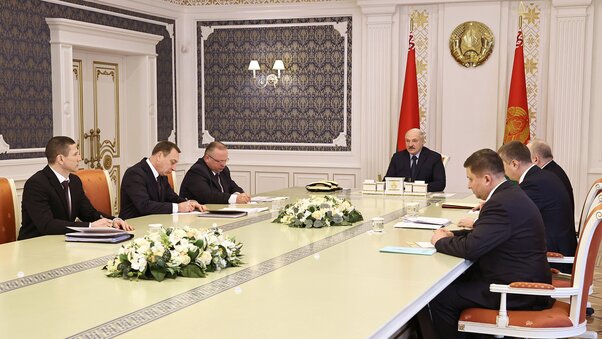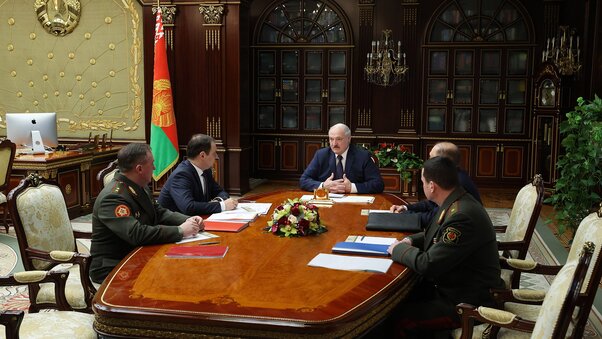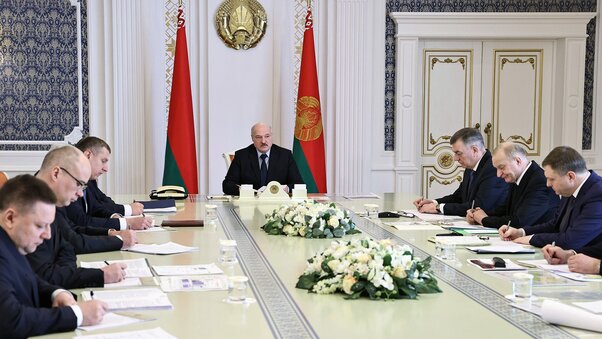Meeting to discuss legislative improvements in the field of national security and public order
- 10
- 4:44
Legislative improvements in the field of national security and public order were on the agenda of the meeting hosted by Belarus President Aleksandr Lukashenko on 18 March.
The head of state recalled that a month and a half ago, a discussion was held on whether the existing legislation was current with the changing environment and whether it allowed effectively responding to modern challenges. “The conclusion was unambiguous: a comprehensive overhaul of the legislation is needed, including criminal, labor and other laws.
“It shouldn’t be just about tightening the screws. Some crimes should entail a harsher punishment, while other offenses should be punished more leniently,” the Belarusian leader emphasized.
This is prompted by the demand from ordinary citizens to ensure public safety, maintain order and peace in the country, Aleksandr Lukashenko emphasized. The President reiterated that the legislation should not only be able to promptly respond to any violations, but it should also prevent possible threats.
After an earlier meeting, the parliament, the Belarus President Administration, the State Secretariat of the Security Council and other government agencies drafted about a dozen bills within a short period of time. As the head of state noted, these documents should be scrutinized by the parliament and put into effect in the near future.
Aleksandr Lukashenko noted that the Russian Federation had amended its legislation within a short period of time. “After seeing what happened in Belarus at the end of last year, they learned certain lessons, and adopted a number of laws in a transparent, clear and open way. Their example is very important for us with regards to the time frame and essence of the legislative process,” the President said. He mentioned the adoption of the law to counter the glorification of Nazism. “This is a very important issue for us. They took concrete steps in this direction. Why not make use of this experience the way they used our bitter experience,” the Belarusian leader said.
“According to our intelligence services, they won’t let us live in peace. This means that we need to be prepared for any manifestations of destructive activity: from calls for illegal strikes to manipulating people’s minds through Internet technologies. We should have adequate tools to respond to each such move,” the President said.
The head of state addressed a number of questions to the participants of the meeting, including senior officials of the government, parliament, judiciary and law enforcement agencies. “What fundamental changes are proposed in the criminal legislation? How drastically has it been revised? Is it able to fully protect the constitutional order?” Aleksandr Lukashenko asked.
“People should be aware of these amendments, study their content and clearly understand what the consequences will be for those who break the laws,” the Belarusian leader emphasized.
The head of state also asked what mechanisms are proposed to combat extremism, maintain national security and protect public order.
Aleksandr Lukashenko also asked what was done to put things in order in the legal profession. “The main task of this legal profession is to protect the legitimate interests of citizens, businesses. Do they strictly observe the law? I would like to reiterate without trying to intimidate or put pressure on anyone that the perpetrators will be punished, people who are not guilty will be able to continue working,” the head of state said.
In addition, the President asked what else should be done to make sure that people can live and work peacefully, while civil servants, the military can fulfill their duty. “The disclosure of personal data, threats to families and children on the Internet - this should be nipped in the bud. I really mean it,” the Belarusian leader emphasized.
At the beginning of the session, Head of the Belarus President Administration Igor Sergeyenko noted that in pursuance of the instructions of the head of state, a large-scale overhaul of the legislation was carried out. Legal norms were studied in relation to the events of the post-election period and the need to prevent new possible forms of destructive activity. This work was done on multiple fronts. Two working groups were put together at the Belarus President Administration and the State Secretariat of the Security Council. The first one dealt with improving the criminal code, the second one coordinated activities to amend legislation in the field of public security. There was constant interaction between the groups.


